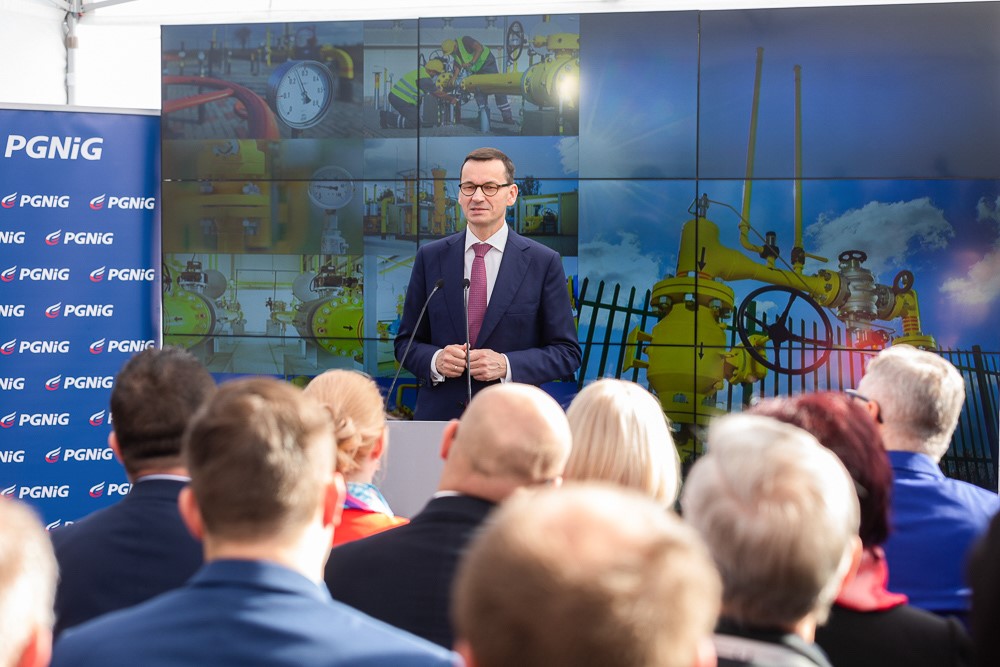Poland’s government has again voiced its criticism over the recently completed Nord Stream 2 pipeline that will bring gas from Russia to Germany. The Polish prime minister accused the two countries of forming a “brutal alliance” against the interests of other European states, while the president has criticised the project at the UN.
Meanwhile, the European Commission has, in response to a Polish request, said that it believes Nord Stream 2 does not further the goal of energy security or diversification, but noted that it does not have the power to stop the project.
At a press conference this week, Mateusz Morawiecki, the prime minister, reiterated long-standing opposition to the pipeline by his government, which says it will harm the interests of countries in the region, in particular Poland and Ukraine.
“But unfortunately, this German-Russian alliance, which was consummated in the form of Nord Stream 2, was very brutal and treated the interests of other countries in a very brutal way,” said Morawiecki, quoted by wPolityce.
The prime minister called the pipeline “a strategic mistake” and said that rising gas prices are evidence of this. “Giving additional instruments of price blackmail to President Putin increases the possibility of exerting pressure on Europe,” he warned.
Meanwhile, during his address at the UN General Assembly this week, President Andrzej Duda criticised western countries for allowing Nord Stream 2 to go ahead despite Russian aggression against Ukraine. The pipeline will “bring further billions in revenue to the aggressor” and leave Kyiv “in even bigger danger”, he warned.
Speaking separately to the Polish Press Agency (PAP) in New York, Duda likened Poland’s sense of betrayal over Nord Stream 2 to how the French have reacted to Australia’s decision to abandon a submarine deal with Paris and instead turn to the US and UK.
“I understand that when they say it’s a European problem, the French mean that if they can be treated this way, everyone else can be treated this way too,” said the president. “I can say the same about Nord Stream 2.”
I asked President @AndrzejDuda for his take on the US-French crisis.He compared it to the US decision on NS2, says he sympathizes with the French. Added that it poses Q whether other European allies "could be treated this way". Says he hopes US will reflect on it #AUKUS
— Oskar Górzyński (@OskarGie) September 21, 2021
Earlier this year, Polish foreign minister Zbigniew Rau criticised the US for not consulting its decision to lift sanctions on the Nord Stream 2 pipeline with Poland and other countries in the region. He warned Washington that it was falling into the same “Russian trap” as Germany.
In February, Morawiecki also condemned Berlin for “acting behind the EU’s back” over Nord Stream, which would “facilitate Russia’s aggressive policies, increase the dependence of Europe, and harm the economy and security”.
This week, the European Commission responded to a request from Anna Fotyga, an MEP from Poland’s ruling party, to clarify what actions it would take to ensure that Nord Stream 2 complies with European rules.
“The commission has repeatedly stated that the Nord Stream 2 project is not needed from a security-of-supply point of view and does not support the goal of diversifying energy sources in the EU,” replied Kadri Simson, the European Commissioner for energy, in a letter seen by PAP.
She noted that a draft decision by national authorities on certification for the operation of the pipeline had not yet been submitted to the commission. But so far Nord Stream has received all necessary permits from relevant national authorities and “the commission does not have the power to act unilaterally”, Simson added.
Construction of Nord Stream 2 was completed earlier this month. Russian later revealed that claims it would start pumping gas on 1 October were not accurate, as it first needed to obtain permits from the German regulator, which may not happen until early next year.
Yesterday, Polish state gas firm PGNiG, which has long been opposed to Nord Stream, revealed that it had been permitted to participate in the German certification process. PGNiG pledged to “prove that Nord Stream 2 AG does not meet the formal and substantive requirements for the operator of a gas pipeline”.
Main image credit: Adam Guz / KPRM (under public domain)

Daniel Tilles is editor-in-chief of Notes from Poland. He has written on Polish affairs for a wide range of publications, including Foreign Policy, POLITICO Europe, EUobserver and Dziennik Gazeta Prawna.




















